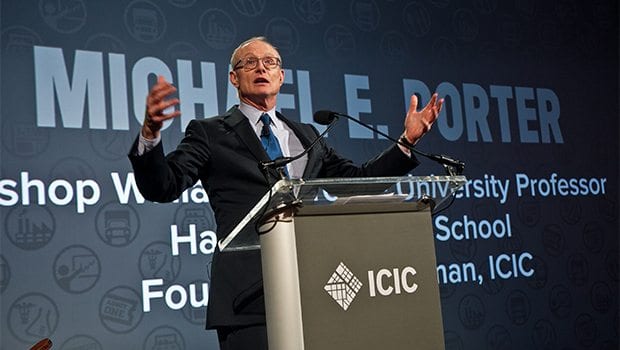Harvard’s Michael Porter: small businesses hold keys to U.S. fiscal health

Harvard Business School Professor Michael Porter had a strong message for business owners and entrepreneurs attending the Inner City 100 Symposium last week — the business environment in the United States is showing some disturbing trends, and small businesses may be the best hope to reverse them.
Honoring 100 of the fastest-growing businesses in U.S. inner cities, Porter stressed that the Inner City 100, which is organized by the Roxbury-based Initiative for a Competitive Inner City, is a perfect example of the kinds of small businesses that can continue to power the U.S. economy.
“Only business actually creates wealth in society,” Porter said. “What is so exciting about this group and this day and what we are trying to do is we are really trying to see if we can invigorate that process of wealth creation in America, which traditionally has been driven fundamentally by smaller- and medium-sized businesses.”
Porter, who founded ICIC in 1994, gave a keynote presentation titled “Enhancing U.S. Competitiveness” during the second day of the Inner City 100 two-day event at the Seaport World Trade Center on Oct. 15-16.
Speaking about work he and his colleagues have done at Harvard in examining U.S. businesses, Porter highlighted his efforts to understand and improve the competitiveness of small businesses in the United States and examine how they can compete successfully in the global economy while supporting high and rising living standards for Americans.
“The bottom line is that what you are doing is probably more important to America today than it has ever been in the history of America,” Porter said. “What we have discovered about the U.S. economy just reiterates that the fundamental thing that is going to make us work or not work is what you are doing — building these businesses.”
Porter and his fellow Harvard academics have examined U.S. competitiveness through three main questions. Does America really have a competitiveness problem? How did America get here? What should leaders do to restore U.S. competitiveness?
According to Porter, the competitiveness question is so important because when U.S. businesses are able to compete and be successful in business, particularly internationally, they are able to deliver high and rising standards of living and income to the average citizen.
“If we have businesses doing well and workers are doing poorly and are seeing their wages under fire or cannot find adequate employment we are not competitive,” Porter said. “If workers are doing really, really well, but businesses can’t compete in international markets, we are not competitive. Competitiveness in a sustainable way only occurs when you can do those things together. When businesses can prosper and when workers can prosper — together.”
Looking back to the 1960s, Harvard has uncovered a series of trends related to business growth and the economy — most of which began around the turn of the century — that Porter repeatedly called disturbing.
These include: a substantial drop in the creation of jobs; a growth in businesses serving local U.S. markets, but no growth in businesses serving international markets; no growth in income distribution to 99 percent of the workforce; a decrease in percentage of the U.S. population participating in the workforce; a drop in the number of businesses created and a rise in the number of businesses closed; and an increasing trend in which large businesses and high-level executives are doing well, while small businesses and the average American workers are not doing as well.
The last trend, more than any other, really concerns Porter. The Harvard report emphasizes that the U.S. economy is only doing half its job.
“We are doing the part about allowing substantial American companies to do okay in the international market, even well, but we are completely failing at retaining and improving the standard of living for the average citizen,” Porter said.
Porter cautions against thinking that government stimulus efforts or the performance of the stock market are places to look to figure out what is causing these trends.
Harvard has highlighted several factors that have fueled downward trends: the shortage of productive workers, weak consumer demand and disgruntled voters providing less support for pro-business policy.
He said that while the debate rages on issues such as the minimum wage or tax inversions, real business policies that could impact the growth and success of U.S. businesses are ignored.
Policy that could simplify the complexity of U.S. tax codes, streamline regulatory processes, improve logistical infrastructure, open doors to needed skilled labor from other countries and lower health-care costs for small businesses, would all have a bigger impact on the U.S. economy and the business environment than the minimum wage or tax break questions, according to Porter.
“There is a lot of simple stuff where we have just let it slide, and you know what other countries are doing? They are getting better and better and better. If you go to China and look at the roads, look at all the infrastructure, look at the business environment, look at all the stuff that we have ignored, they are working on it. They are working on it every day,” Porter said. “I have worked with many of these countries. They have a national strategy to improve their business environment. They work on regulations. They work on their logistical systems. They work on this stuff. They get better. What do we do? Nothing.
“Ultimately America can still be the greatest economy on the face of the earth, but unless we start moving on some of these things then it is not going to get better,” he said. “I think many of you in this room, given who you are and what you are doing and what communities you are doing it in, you can be very influential in starting to shift and change the dialogue and the narrative about what we need to do in this country.”






